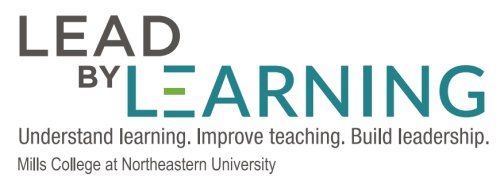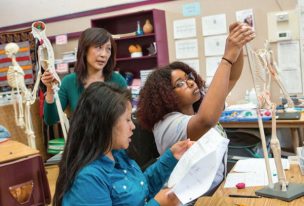Writing Workshop Success Through Social Emotional Learning
In the winter of my first year teaching third grade, at the time that I started my Teacher Scholars inquiry, my classroom community was struggling. My students were constantly arguing with each other, and many of them did not feel competent in their reading, writing, and/or math skills.
I believe in the importance of helping my students develop the relationship skills needed to work well with each other and in psychologist Lev Vygotsky’s idea that interactions with peers are also an effective way of developing students’ skills and strategies. Nevertheless, I felt like I was not giving my students enough time to collaborate in a meaningful way with their classmates due to time constraints within our daily schedule. I wanted to use my Teacher Scholars inquiry work to address this and determined that Writing Workshop held tremendous potential for students to grow their own skills and confidence as writers and build relationships with their peers through working together and sharing parts of themselves in their writing.
While fourth and fifth grade had engaged in Writing Workshop the previous year, this was the first year third graders had been exposed to this approach to learning. I quickly learned that my students needed significant explicit instruction and scaffolding surrounding writing, specifically with transferring what was taught in the mini-lesson to their own writing. Students often complained that they didn’t know what to write, and were constantly asking me to help them every step of the way, sentence by sentence. Through writing partnerships I hoped that they could build some autonomy. In my initial inquiry sessions, I determined that my specific learning goal for my students involved them:
- Listening to each other during writing conferences
- Giving and receive feedback
- Incorporating that feedback into their writing
“She’s not listening to me!”: Initial Findings
I couldn’t wait to get started collecting my data for my inquiry sessions. I had visions of students eagerly reading each others’ work, listening attentively to their partners and really taking charge of their own writing. However, when I began implementing what I thought were small changes to my workshop— like giving them five to ten extra minutes to share their work and talk with one another— I realized that nothing was changing at all.
“She’s not listening to me!” complained one student.
“I can’t read that,” said another student in a harsh tone, referring to his partner’s handwriting.
When many students read their writing aloud to their partner on the rug, they faced the front of the room, not talking to anyone in particular, while their partner looked anywhere in the room but at their partner or their writing.
At first, I was disappointed— I thought that my inquiry had failed. They clearly were not meeting my learning goal.
Modifying and Narrowing My Focus to Bolster Student Success
After meeting with our SEL Teacher Scholars group, analyzing video data of partnerships, and sharing my feelings and thoughts with my colleagues and my Oakland Unified SEL coach, I realized that I was really asking students to do a lot. Before students could successfully engage in writing partnerships of the sort that I envisioned, they needed practice with fundamental partnership skills like active listening, sharing with one another, and taking turns. My inquiry had not failed, in fact it had showed me a path forward–I just needed to scale way back and begin with the basics.
To build the social emotional competencies necessary for Writing Workshop, I began implementing frequent end-of-day whole class check-ins from the Caring School Community program, a curriculum for grades K-6 that develops students’ social and emotional skills while also building classroom and school-wide community. I held these check-ins 3-4 times a week at the end of the day, in addition to the end of various class activities several times a week— after a partner math activity, or after coming back from P.E., before I started the day’s read aloud.
First, we focused on explicitly defining what it means to be a good listener. Then, I gave them multiple opportunities to practice the skill during check-in meetings through turning and talking with their partners and sharing through different question prompts such as, “What was something that was challenging today?” or, “What went really well in P.E. today?” Sometimes we practiced asking our partners follow-up questions and practiced the skill again through whole-group listening when students took turns sharing with the whole class. Finally, I would have the class rate themselves on a scale of 1-5 on how well they thought we listened as a whole class. We would share what we did well while we were listening, as well as what we were going to work on next time.
Over the following couple of months, I began to see significant growth in the way my students shared and listened to one another in all areas of the curriculum, including writing partnerships. They made more eye contact, didn’t talk over one another as much, and truly began to demonstrate that they cared for one another. During a “Publishing Party” that we held at the end of a narrative unit in Writing Workshop, my students did an amazing job reading one another’s writing respectfully and writing positive comments to one another. At the end of the party, two of my most struggling writers read their stories in front of the class and their classmates all listened intently, laughing out loud at the funny parts, applauding at the end. It meant so much to see these two students experience success and to feel the sense of community.
While writing was the main area of the day I was focused on, I began to see that the self-awareness and relationship skills that we had been practicing had transferred to other areas of the day. After a partner math activity where students had been asked to classify polygons in different groups, each partnership presented their work to the class. I had put sentence frames up on the board to encourage their use of academic language and class discussion— such as “Why did you put that polygon with that group?” All on their own, students began raising their hands and giving their peers compliments on their posters as well as asking follow up questions. In previous sharing activities I had always had that sentence frame on the board: “I like the way you…” as a requirement, but this time I had left it off. They had internalized giving positive feedback as a part of the peer feedback process!
Take-Aways & Next Steps
I began this inquiry in February, and while I did not get to delve as deeply into Writing Workshop by the end of the year as I wanted to at the start of my inquiry, it got me very excited to continue it this year with my new group of students. So far this year, I have been holding CSC meetings much more frequently, teaching the SEL competencies to the kids explicitly, and providing many more opportunities for the partner/group work and collaboration practice that I now understand are the building blocks to productive writing conferences. The sense of classroom community in my class at the beginning of this year has already been much stronger than it was in my class at the end of last year, and I feel that is because this year I’ve been more intentional and explicit about teaching the SEL competencies and giving them significantly more opportunities to practice and reflect on them.
Through my inquiry work, I have learned that “messiness” is part of the process of teacher learning and trusting ourselves as educators is key. All students are capable of learning and experiencing success, but as teachers we encounter seemingly endless challenges and barriers to helping our students learn. Especially as a newer teacher, it is easy for me to get down on myself thinking that I’m failing my students. However, through trying various strategies, looking at data, asking myself questions, reflecting on my practice, and then starting the cycle over again, I find small moments of success– small moments that mean everything— like one of my students shouting out during a math activity, “Ms. Owens! We just used two relationship skills! We are sharing and giving each other compliments!”
On the last day of school last year, I let my students do an informal talent show where volunteers were able to go up in front of the class and perform whatever they wanted. Some kids sang in a group, some kids told a joke, or acted out a short skit, or told a riddle. In previous sharing activities like this throughout the year, I had quickly realized I had to be very explicit and structured with every little detail because the kids would erupt into arguments very quickly. However, during the talent show I was amazed at how well the students themselves were able to facilitate the entire event. They took turns, listened attentively, and were positive and supportive of each other, regardless of who was in front of the class. I sat at one of the back tables and felt my heart melting at seeing my students’ personalities really shine and the positive energy that permeated throughout the room.
While this was just a small moment, it illuminated for me my students’ growth and how the SEL skills that we practice with them can be transferred to any activity and show up in many different ways throughout their lives, both in academic and nonacademic settings. Teaching SEL skills cannot be a separate part of a child’s education— it needs to be interwoven into every aspect if we expect to support growth in academics, classroom community, and each child’s wellbeing
SEL Teacher Scholar Ruanna Owens is a third grade teacher at Garfield Elementary in Oakland Unified, where she is part of the SEL lead team responsible for supporting staff with the integration of SEL into academic content areas. She received her credential and MA in Education from UC Berkeley’s Developmental Teacher Education program.

